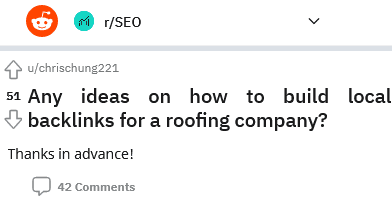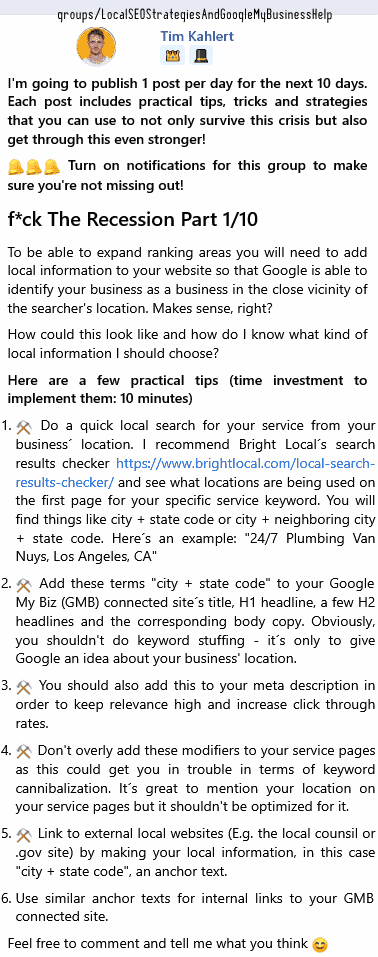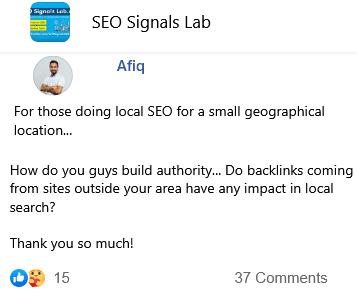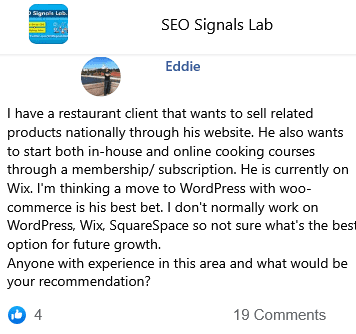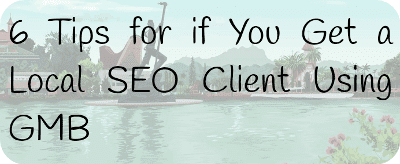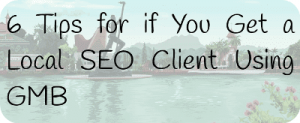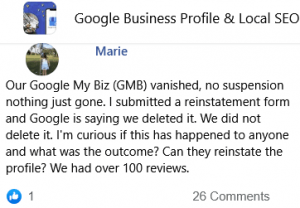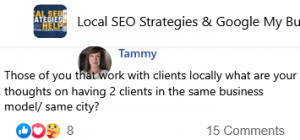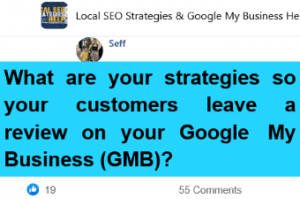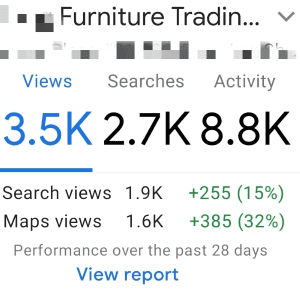And it's a good question because once you have been doing something long enough, you know how to do it better.
But here's the thing, from helping hundreds of local business owners, I've learned not only how I should start over, but how you should too.
So, I created a 30-day plan on exactly how I would launch my local business if I was starting FROM SCRATCH again.
Thought I'd drop it here for you guys.
Below is a MONSTER post that covers exactly how I would build a new local business if I Suddenly LOSE EVERYTHING and only had 30 days to start over from scratch.
You can always reach out to me with any questions or for advice and I will do my best to help you.
Ready?
Let's jump in.
Day 1: Reflection
Ok! Day 1.
I want to take the time to make sure that this is what I want to do, and to set my commitment for it*
I know this will not be an easy journey the next few months, however, I am doing this to give myself true financial freedom and power over my future.
So, I will take two hours to write down my thoughts and hopes for this business into a journal. I will also write down what my long-term goals really are, and then work backwards to see if they are aligned with this business.
But most of all I will take time to kick back, relax, and get motivated. Because now that I've committed it is time to get down to business.
*This is an important day, even if you feel like you won't be doing a lot. What you are really doing is gaining clarity on what you want to do. You do not want to commit to a business and then find out months or a year later that it is trapping you and not letting you do what you really want.
Day 2: Getting Down to Business
Today is where we start looking at all the amazing opportunities and different types of local businesses in our area to see what lights a spark in us.
Go for a walk for an hour or two in your town or city and really look around at all the businesses that you see. Look at the cars passing you by and you'll see plumbers, electricians, bathroom remodellers, or appliance installation services.
You probably never thought about this before, but all the businesses that just passed you by or you walked pass? The vast majority of those are 6 & 7 figure businesses. Run by people who have absolutely no business experience but are just good at what they do.
They are small operations, but they can bring in serious money. So, start taking notes on businesses that you pass by, just a giant list of every single one. Now when you get home, go through that list and pick the top 5 appealing ones, or the ones you've never thought about before that seem interesting.
And just start playing around, go on YouTube and learn about those five different niches. How they work, how much they charge, and so on. Lastly, take a moment to think of the possibilities. Because most of these businesses are being run the same way they were in 1980 and 1990, and you have access to some of the most amazing marketing and sales knowledge FOR FREE. Strategies that work in < year >. You need to realize the power at your fingertips.
Because tomorrow you're going to decide on your niche and get going for real.
*Really do this because it far more insightful than just visiting Yelp and looking at the different niches.
Day 3: Decide on Your Niche
Today is arguably the most important of the entire 30-day plan, because you are going to decide the niche that you will be working in for the next few years. Yesterday when you looked through your 5 chosen local niches, chances are one or two of them appealed to you more than the others. So now it's time to decide between your top 2.
A couple important qualities to help you narrow the choice down:
-Should have good profit margins (above 20%)
-No licensing required in your state (some industries, like painting in certain states require thousands in licensing fees and are a very real bottleneck)
-Do not require you to personally be in the field
-Already have companies in your area doing well in that niche (means there is plenty of business on the table)
Here's a very important tip: If you're really struggling between the top 2 and you just can't choose… Choose the one that will leave your options open for growth later.
For example, I run a cleaning company, which has allowed me to expand to window cleaning and carpet cleaning services as I have grown. Over the next couple of years, I can even start offering home organisation if I want to.
And if you are still unsure, shoot me or the community and message. I'll be happy to help you choose. Regardless, you really need to choose TODAY because this is one of those decisions that if you let it, will stall you forever.
Tomorrow is going to be interesting because we're going to look at your local competition and use their weaknesses as our strengths.
Day 4: Scout Out the Competition
Welcome back!
Today, we will be doing competitive research on your chosen local business niche. This will be a quick, but powerful lesson for you because it will set the foundation of your branding and marketing. For this lesson I will use the example of a cleaning company in Spokane, Washington. Just replace this term with your chosen niche and city.
You may have heard of a SWOT analysis in a marketing or business class, but I assure we will not be filling out any boring charts or tables. Rather, we will be doing a rudimentary and real-world analysis. A quick and dirty SWOT analysis, if you will.
Ready? Let's Go.
Head on over to Yelp.com or Google.com and search "cleaning company Spokane wa" and "cleaner Spokane wa". Now, open the top 10 companies that appear and grab a notebook. Go to their reviews section but ignore the 5* reviews for now. Instead, focus on their 1*, 2*, and 3* reviews.
Start taking notes on why the cleaning company got that bad review. You may find that some of the most common reasons are:
1.People don't answer their phones
2.People show up late and don't tell you
3.Their team rushed the job
4.There was poor communication before, during and after the cleaning job
5.They are unwilling to fix an issue the customer found
Notice something?
None of these reasons are related to the actual cleaning part of the job. They are all to do with the customer service side of the business.
Here's the beauty in this – if you can do a better job than the competition on customer service your customers will always prefer to work with you. So many local businesses are run by amazing technicians who are great at what they do. The reality is they can't be good at everything and often their weak spot is customer service.
What you can do is take the top 5 patterns of bad reviews you wrote down and turn them into your strengths. You can start branding yourself as having great customer care, easy to reach, and always willing to make an issue right. The fact is, you don't need 20 years of cleaning experience to own a great cleaning company! You just need to hire the right people and provide a great experience to your customer.
Treat your customer onboarding like a 5* hotel check-in and make the entire experience flawless. All we are doing is finding out what annoys our future customers and just not doing that.
That's it!
Day 5: Residential vs Commercial
Now that we've chosen our niche, for many of us the next step is to choose if you're going to be doing residential or commercial work from the get-go. This is a really important decision to make because if you try do to both at the same time, you'll find that the marketing and sales process for them is very different from one another.
I want you to concentrate on one at least the first year, so you can allow yourself to build a level of competency within your niche and your focus. Take painting – residential exterior and interior painting are a whole different ball game then commercial painting, or new construction painting. They have different marketing, different profit margins, different expected turnaround times, and different scales. To the point that you can have a painting company for 20 years and never explored other types of painting.
It's the same with cleaning. My cleaning company does primarily residential and vacation rental cleanings. We have never done a single commercial or office job in years because we need to hire a different type of cleaner, on a different schedule, with different pricing. Far better to double down on what is already working until you need to add services to grow.
Take some time to think about which one you want to start with, but here's what I will say. If you are a new business owner, I would recommend residential at first. Commercial can scale larger more quickly than residential but residential is a much better starting option because the marketing and sales process tends to be a lot easier. And there is less risk of having all your eggs in one basket with a big commercial client (who pays you two months late and causes payroll issues…).
This is a really short-day guys so I don't want you to spend all day consumed by worrying about making the wrong decision but do give it some serious thought today and commit to one or the other.
Day 6 & 7: Create Your Website & Online Presence
Welcome Back!
The next two days are very important ones, because you will be making the first real step in starting your local business. We will be setting up our online presence to make our business easy to discover and convenient to book.
So, first off what online presence is essential for us to have?
Here is what you need to have:
Website – there are three parts to your website that you will need to include, at a minimum.
The first is to buy your domain name and hosting once you have chosen a name for your local business. I recommend Namecheap (I personally have dozens of domain names through them). Their support is phenomenal whenever you have a problem, which is almost unheard of in that industry.
The second is to buy a good-looking website theme. Chances are, somebody has already made a beautiful theme for your niche that you can buy for less than $50. There are dozens of great cleaning themes for $27-$47 and I am sure there will be for yours too. Do not pay a professional at first, instead use that money for marketing later.
The third and final part you will need on your website is a convenient booking form so that customers can book without any hassle. Nowadays, so many potential customers expect to be able to book online and don't want to be forced to call…so you best make sure you make it as easy as possible for them! See if there is a specific booking form for your business first – if not then use a more general one.
Please don't spend a week on your website trying to make it look perfect, it should just be professional and convenient!
As well as a website, you will need to claim all your social profiles immediately. That includes Facebook, Next Door, Alignable, and any well-known local social sites in your area. If relevant to your industry Twitter, Instagram, or YouTube may all be worth including.
I won't lecture you on why you need to claim your social media profiles…at this point I think we all know just how powerful social media can be for any business.
Finally, once you have claimed your social profiles and built your website, the last step to take is to build your profiles on relevant marketing channels.
Across industries the most impactful ones currently are:
Google My Business (very important)
Yelp
Thumbtack
HomeAdvisor
AngiesList
And if you are in the UK Bark has been making a big splash lately.
It is worth spending considerable time on your profiles and templates for these websites because for the first year most of your customers are likely to come from them. One way you can make sure you do it right is by finding the top pros in your area and in major cities. Study their profiles on these sites and see what they are doing to promote themselves.
"Absorb what is useful, Discard what is not, Add what is uniquely your own." – Bruce Lee
I bet you didn't expect to find a Bruce Lee quote in a plan about building a business, did you?
One last points – make sure you build your profile on smaller region-specific marketing platforms too. Most people don't bother, and you can turn this to your advantage. Often just having a couple good reviews on smaller platforms is enough to propel you to the top and claim all the jobs that come through. You can dominate these small marketing channels with little effort and a worthwhile reward.
At this point, do not start spending money on advertising platforms yet, we will get to that soon.
That's it for today!
Good work.
Day 8: Choose A Booking Software, Payment Processor & Phone System
Day 8 is very close related day's 6 and 7 and is an integral part of how you will do business every single day.
I touched on the booking software briefly yesterday, but I wanted to give you a little more insight into that. There are great general booking softwares/77CRMS out there like MindBody or Jobber, but if you can see if you can find one specific to your niche. There are booking softwares that only do cleaning companies for example, and their forms and structure are optimized with cleaning companies in mind. If you have chosen pressure washing, painting, appliance repair or whatever…see if there's a booking form specifically for those if you can.
The second thing is your payment processor. I'm just going to go out and say it 99% of the time you should use stripe. I haven't used Square myself but I do know about people who have you swearing than happy with it so I think that's a fine option as well, particularly if you take card payments on location.
A good virtual phone system is also crucial. Now, my Virtual Assistant (VA) business runs over 50 local businesses for the owners, so we have great insight into pretty much every virtual phone system out there. The two that…while not perfect and they have their own flaws, I would recommend are Grasshopper and RingCentral.
This is very important. Do not use you personal cell phone number. I cannot tell you the number of times I have talked to business owners who used their personal phone number in the beginning and have had to change their personal phone number or get a new one.
Get a separate number for your business. This is not negotiable.
If you've read this far, we're now on week 2. I know there's been some fluff at the start but a lot of this is very important to set the groundwork correctly for your business. But from here on out, we're starting to get into the nitty gritty and launch this baby by figuring out pricing, hiring our first team, starting marketing and getting our first few customers.
See you tomorrow!
Day 9: Figure Out Your Pricing
Pricing is something you can spend a lot of time optimizing, but I recommend you use a simple pricing method your first year so you can get on with building the business.
Look at your top five competitors (have the best reviews and a good customer base), and either copy their pricing or add 20% on top of their pricing at first.
What you are going to do when you start with 0 reviews is tell people your price, then discount their first booking. This gives them an incentive to book with you. I know, I know, everyone says to avoid price shoppers, but guess what? When you have no reputation or reviews that is who you are stuck with, so get on with it and make them happy. This is how as a new company I was able to get hired hundreds of times off of thumbtack over the course of a few months, outranking companies who have been around for years with impeccable reviews (we also followed up like crazy).
The strategy goes a little something like this, regardless of the platform: The first 10 people receive a 35% discount and you really push them for a review, when you have 10 reviews you drop it down to 30% discount, when you have 20 drop down to 25%, when you have 30 down to 20, and so until your typical charging your normal price or giving them a small discount as a first-time customer.
Day 10: Take A Break
Seriously, take one. You're doing a LOT in a short amount of time, even if it feels manageable right now. We want to build good momentum, not bad momentum that heads us towards a crash because we never take a break.
Day 11: Put Together A Budget ($500, If I can)
Ahhh budgeting, how fun! This is another one of the most important days, especially if you are a student or you don't have a lot in savings. Putting together your budget is a necessary part of starting a business. You can start a service business incredibly cheaply and do the labour yourself the first few weeks to build up some cash reserves, but in my experience if you can it is better to start with teams from the beginning. I know many owners who get trapped being the tech in their own business and it can take years to transition out of that mindset and role.
You could buy a window cleaning kit for $50 and start knocking door to door…this still works brilliantly in < year >, by the way. But if you want to build a real service business then we need a bit of money for your website and marketing.
If you can swing it, I recommend $1000 for everything to start. you can't I strongly advise $500 minimum, because that would be very tight as it is. The truth is you are not going to know where your money is best spent at first, so you need some time and money to figure out what marketing is working best for you.
So, put together your budget with as much as you can set aside (there are always small unexpected costs).
Day 12: Create Your First Job Post
Let's jump straight into it today and create our first job post!
Go on craigslist and indeed.com, see what job posts are doing well in your niche start to craft your own in a similar style. Here's one I use for cleaning that I tweaked from one I found (funny enough, on Reddit!) years ago that has always worked well:
Subject Line: Looking for Two Person Cleaning Teams (Washington)
Looking for Two Person Cleaning Teams ({Washington DC} & Surrounding Areas)
We're a cleaning company that expects a rush of clients as the summer winds down and we need a few teams to help us out.
This is for residential cleaning. We pay per cleaning.
**Residential Cleanings**
*Studio Apartment – $75
*1 Bed 1 Bath – $85
*2 Bed 1 Bath – $95
*3 Bed 2 Bath – $125
*4 Bed 2 Bath – $135
**With Extra Services Tacked On (Example: Inside Fridge, Cabinets, and Interior Windows)**
*Studio Apartment – $90
*1 Bed 1 Bath – $105
*2 Bed 1 Bath – $115
*3 Bed 2 Bath – $155
*4 Bed 2 Bath – $185
We typically send two-person teams, so extra points if you
A) Have a cleaning partner you can work with
B) One of you has a car
If you're interested, please fill out our application here to begin the application process –
yourwebsite.com
Thank you very much. We'll respond quickly.
Try not to spend more than 3 hours searching and creating your job posts. To start, create two totally different ones and post them on both craigslist and Indeed.
Day 13: Interview Potential Teams
Most of the stuff you're going to read about hiring doesn't really apply to you. A lot of it is about corporate recruiting, tech recruiting, and review processes that are too in-depth and cost a boatload of money.
Unfortunately, there are not that many good resources recruiting for local businesses, but here is an excellent one to get you started: https://academy.getjobber.com/tags/hiring/
They have job posts and descriptions for all kinds of niches, along with hiring tips and questions. I wish I knew about them when I was getting started. Go through their hiring vault and start drawing up a list of questions to ask your potential candidates. If feasible, have them do a trial service at your place so you can get an idea of if they can do what they say they can.
Straight up make sure they are polite, have reliable transportation, are citizens, can submit to a background check, and already have years of experience. Remind them the day before the interview, AND the morning of the interview.
At first, aim to bring on two good contractors even if you don't have any work at first. As contractors, they already have other work to keep them busy, so they are not solely relying on you for income. The other reason you want two teams is if one of them decides to no-show the first couple of jobs, you could reschedule with the backup team.
Day 14: Hire My First Team
We have our first job ads up, candidates are applying, and you think you've found a couple winners!
There is a few important things you have to do to formally bring them on as an employee or contractor. I'm going to assume you're going to use independent contractors for now.
Non-negotiables:
-Have them fill out a W9 BEFORE doing their first job. You will need this at the end of the year to issue them a 1099.
-Draw up a subcontractor agreement for working together.
-Background check them using a service like Onfido.
-Make sure they have insurance
With those done, you are going pay close attention to the first three jobs. The first few jobs you want an outstanding experience, because this is the Foundation of your business' reputation that you are building in the early days.
If you have all of those pieces sorted, start to walk through expectations of working together. How much they will get paid, how you will send them jobs, and so on.
With those done, you are going pay close attention to the first three jobs. The first few jobs you want an outstanding experience, because this is the foundation of your business' reputation that you are building in the early days.
Day 15: Start Organic Marketing
While everyone is talking about optimizing Google Adwords campaigns, Facebook Ads/Clickfunnels, and the latest paid service, you can get a ton of business completely free.
Here are four quick ways we get several bookings per week consistently for years, without spending a dime:
Local Facebook groups:
Go join local mum groups, discount groups, flea market groups, student groups and local networking groups on Facebook.
People love to interact, get helpful advice from each other, and recommend each other.
If you have a slow booking day where your schedule is just not filling up, you can offer a crazy discount to flea market/garage sale groups and often get some bookings. The goal is not to make a profit on the discounted clean, but to have them become a regular at your normal price.
Do this 2-3x a week in various groups and you will start building authority and bookings from that group. When you post make sure you include a screenshot of some 5* reviews of your business so they know you are legit and let them know you are the owner.
Next Door:
Next door is such a wonderfully underrated platform, and it's the way Facebook groups should be. You have your neighbours in a discussion board just for them, and recommendations feature that you can get other members to recommend your business. Our cleaning company has gotten a lot of business from Next Door, simple by asking our customers already on there to recommend us. We also provide a neighbour discount exclusively for them.
Hell, we even hire cleaners from Next Door sometimes by asking others if they have a good cleaner they know looking for more work.
This is a great avenue, if you authentically engage and be helpful, instead of just being salesy. Spend 5-10 minutes a day on there commenting and giving your own recommendations. I often see handymen recommended on there and know they get a ton of referral business from it.
Alignable:
Alignable is useful because it allows you to connect with other local business owners without having to pay BNI or your chamber of commerce a bunch of money every year. This is a fantastic platform to refer each other business and create interesting service partnerships. As an example, what we do is every spring season get together with window cleaners and home organisers to specials where people can get 2-in-1 or 3-in-1 services done at the same day, with us taking a chunk of the profits.
Door-To-Door:
I'm not going to say too much about door to door, but it is still very powerful method in < year > for getting a lot of business, particularly for high-ticket seasonal services like painting and pressure washing.
There are a dozen wonderful organic marketing methods I could talk about, but here are just a few to get you started and thinking. Set a goal to be doing some sort of organic marketing every single day consistently. Because once you start getting more bookings from organic marketing it starts to speed up and referrals start coming in naturally. This is a key advantage over paid marketing.
Day 16: Choose Your Top 2 Paid Marketing Channels To Test
You do not want to try out 10 different paid marketing channels your first few months, you will go broke and waste your money getting no bookings. Instead, focus on two great ones in your area and become an expert at them.
Here is my recommended list for new service businesses to explore. Keep in mind EVERY CITY is different and certain ones will perform better than others:
Google Local Ads – this is Google's new service, and it is performing far better than Adwords across most of the country. Get in while it is hot since most competitors aren't using it yet.
Yelp – sorry, I know their management sucks, but they can get you a lot of business. If you do go with yelp, make sure you build up 10-15 positive reviews before paying for ads.
Google Adwords – don't do this at the start unless you already have experience or a big enough budget to pay an expert to do it for you. I recommend not paying someone for Adwords help until you hit around $10,000/mo in revenue.
Thumbtack – Still a fantastic platform to get hired through, but follow-up is key (it always is, but even more so for thumbtack). Send a quote, then follow-up when they see it, follow-up end of day, the next day, two days later, and three days later with a final message. Revisit them 6 months later and ask them if they need service.
Facebook Ads/Funnels – don't play around with these yet. Facebook marketers will tell you these work for every niche, but they don't.
Craigslist – placing ads is still cheap and can get you a lot of inquiries, so this is very worth it at the start.
Amazon Seller Central – they take a cut of each job, but they WILL get you jobs. This is great the first few months when you are doing discounts, because even if you don't make money on the front-end you can push to have them become regulars.
HomeAdvisor – it CAN work, but your leads are not exclusively sent to you and they charge a really high cost per call. If you have a big budget try it out, if not try others on this list at first.
Day 17: Rapid Fire Testing
Rapid Fire Testing is a crucial and painfully overlooked part of every business owners marketing strategies. Often, we just throw more money at a marketing campaign we THINK is working, without going through to calculate our Return of Investment (RoI) or optimize them.
Here is a quick way to rapid fire test the marking platforms you are already using.
Let us pretend we are trying to decide between 2 different marketing channels.
For example, if you use Thumbtack with a $150 monthly budget. Assume this gets you 10 quotes, and of those 10 quotes (assuming you have a tight follow-up system in place), you close 4. Your other marketing channel is HomeAdvisor, also with a $150 monthly budget. But HomeAdvisor only brings in 8 quotes, of which you closed two.
Essentially, we are comparing our customer acquisition costs.
For Thumbtack, we get one quote for $15 on average, and 1 sale per $37.50 on average. Whereas for HomeAdvisor we get one quote for $18.75 on average and get a sale for $75 on average.
From this very simplistic comparison we can see that Thumbtack would do far better for you, and it would be worth taking the $150 that you're currently spending on HomeAdvisor and doubling your Thumbtack budget instead.
This is what we want to do regularly from the get-go. Later on, you also want to compare the average ticket sizes that we get for each platform, because as you dial things in more it becomes more important. For example, exterior painting the ticket sizes are often larger than interior painting, and if you're using porch and thumbtack, you may find that the average exterior painting jobs that you close are higher on porch than on thumbtack.
This is a rapid-fire test that should be done at least quarterly.
Having said that, do not over complicate, it's just a quick marketing health check and asset reallocation. So do your rapid-fire test and stick with just the top 1-2 performing marketing channels.
Day 18: Soft Launch
Your soft launch is just an announcement that you are open for business and is a commitment to yourself to really do this.
This can be a good way to get your first few customers, and I see people recommend that often, but to be perfectly honest it can also be really annoying to push your friends and family to buy your business services.
The important thing here is the mental aspect that this is now a real business that you own. It is more for yourself than anyone else and is a safe way to start without being fully ready to go yet (otherwise you may fall prey to perfectionism). Just let people know you are trying this new side hustle out and are excited to see where it leads.
Day 19: Learn How To Pitch & Close
The first in golden rule that I tell people is to treat your potential customers like a hotel reception does when checking-in new customers. Treat them like they're going through the checking process already booked and you are just gathering their information. Assume the sale and walk them through your booking form step by step, answering their questions along the way but making sure that you return to the next step.
There are so many books about sales and so many sales tactics, but to be completely honest with you, if someone is calling you because need their lawn trimmed, or their fridge installed, they just want it over with and are already committed to just getting on with it. Some people price shop, but it is a surprisingly small number of people who do.
Now, as a new business with no reputation, I do recommend offering a discount at first if they resist. I see a lot of business owners say that you should not discount service or devalue yourself, but I think the mindset is so wrong.
What you're doing is offering them peace of mind that you're willing to work with them this first job. Sure, a few people may try and take advantage of you but the vast majority of people do respect you and only ask for a discount the first time.
This is smart to do, because when you discount you increase your sales conversion rate, which allows you to do a stellar job and then makes it 10 times easier to sell them on a recurring service afterwards. So, I typically treat the first booking like a loss leader similar to how a supermarket gets you in the store with cheap milk and bread, because they know you're going to want other stuff or services (which is where the profit is).
If you think about it this is exactly how paid marketing works too. You have a conversion cost when you run an Adwords campaign, and you typically only make a little bit of money or even no money on that first booking (if you have a lower priced service), but your hope is to convert them to a recurring customer and keep them week after week, month after month, where the profit really kicks in. You are doing the exact same thing at the start before you have reviews by offering them a discount. Just sweetening the deal a little bit for them.
One cool thing that has been effective for me, is offer them $25 off their first 3 bookings because it gives them an incentive to come back and still profitable for me at each booking. Find a reasonable amount you can discount that you are slightly uncomfortable with, but you can still make work and try that.
Lastly, do not do not do not get them on the phone…. then tell them to book online. When you do this, you are doing it because it is more convenient for you. It is more inconvenient for them, and you're giving them a chance to slip away and check out a competitor's website and maybe book there. Walk them through and book them while you have them on the phone because your chance of closing that sale once you're off the phone with them drops dramatically.
Obviously, this is just a super brief tip of the sales iceberg overview, but this is a good first framework to use for the first 50-100 bookings.
Day 20: Take A Break
Yes, really.
That's all today folks, check back in tomorrow after taking a nice walk and chilling.
Day 21: Create A Follow-Up Sheet
If this is your first business, then you probably suck at follow up, and if this is not your first business you may have an overly complicated system that you don't use consistently. Totally normal, but it's time to use a simple system that does work.
Below you can see my two-follow-up sheet that I use for my cleaning company, as well as my virtual assistant agency. It is very simple, but very powerful when followed with consistency. I will be releasing a download of the sheets as well for you soon.
Hopefully, it is mostly self-explanatory. But here is in brief explanation of how to use it just in case:
For follow-up calls, start using this Google sheet and fill out the two follow-up sheets with a) Customers after their service and b) Leads who contact you but don't book immediately.
Page 1 is for new leads, and Page 2 are for people who just had their first service that you want to convert into a regular.
Here is a process to follow-up with each person (we basically stop when we get a NO):
Day 1 – Call the lead at 3 different times of the day (only leave a voicemail on the third call). Shoot them a text after the first call to let them know who you are and why you are calling.
Example: "Hey this is Sara from ABC Clean. I was just calling regarding your request for the discounted deep cleaning you want this week. Is this a good time to call?"
So, Day 1:
Call
Text (asking for permission and a time to call)
Call
Call
Voicemail Left On Last Call
Day 2:
Call
Call
Final Text Asking Them To Confirm Interest
Day 3 and beyond:
Shoot them a call or text once a day for the next week, beyond that you can let the lead rest a week then try again. It's always worth trying old leads again in the future.
As a rule, ONLY CALL AND TEXT. No emailing unless you are responding to them. I recommend setting a specific block of time in the evening or lunch to get these done, whenever you think your customers will be available.
Basically, you want a written and categorized track record of every leads that comes to your business from every source. This will not only dramatically increase the number of bookings you get over time, but it will also be helpful when we go back and do our next rapid-fire test. You can visually see over time what sources you get the most new business from.
Day 22: Create A List of Sales Key Performance Indicators (KPI)s
Ok this is the last big day on sales, then we're going to move on to the last few important things.
Last thing you need to do is get a sales structure in place by creating a list of key performance indicators (KPIs) that you will regularly update and follow. I think most of us at this point know what KPIs are, but most of us are probably not actually using them because we just think of them as this boring idea from a business class or a YouTube video.
They are Lifesavers. Here are the KPIs I recommend you start out using. Put them into Google sheet and track them once a week. If a KPI is way off target see how you can get it back on target. If one is performing particularly well see if you can do even more of that:
-Number of leads (eg phone calls in a week)
-% of leads that turn into a sale
-% of one-time customers that convert into a recurring customer
-Total adspend
-Average booking price
-Hottest upsell services
If you do this, you will be way ahead of people who've been in business for years and you will find yourself growing far more quickly than someone in the same business who isn't tracking Key Performance Indicators (KPI)s.
Day 23: Form A Legal Entity
This is not legal advice, but just a friendly opinion of mine. Please talk to your accountant or business advisor about incorporating and have them tell you their professional opinion.
If it were me starting over from scratch again, I would personally form an Limited Liability Company (LLC) right away, and get a separate business bank account from day 1. I know people who have been in business for 15 years and do not still have an LLC. I cannot tell you how nervous that makes me for them because it only takes one big accident for them to be completely screwed.
Forming an LLC only costs a couple $100 maximum and is worth the extra protection it gives you. For me personally, I would file this as soon as I possibly can. Again, this is not legal advice, this is just what I would do if I decide to start another local service business. Remember, this is what I would do if I had to start over from scratch.
Day 24: Figure Out Your Profit Margins
Knowing your profit margins is essential because this is going to be the key that will help you decide how much to pay your teams, how to price your services, how much you can afford to put into marketing and operations, and finally how much to pay yourself out of every $100 that you bring in.
Typically, local service businesses have a much lower profit margin than software or digital marketing businesses. Sorry, just what it is. What we have more consistent revenue and long-term customers than they do (often 10-20 year long customers!)
Brick and mortar is almost always at the bottom here because you have to pay for the physical storefront, products, equipment, rent and other necessities. Your profit margins are usually in the range of 5 at the lower end to 20% at the very high end.
A good business friend of mine used to run a very tight ship at his day spa, where they did almost a million dollars per year in revenue. Let me just say the guy is really good at business he knew how to run his day spa far better than most did, and he was still only able to get about 10 to 12% profit when he (honestly) factored in all expenses.
Most local service businesses are going to be in the 15 to 35% profit margin rate. Think of house cleaning, roofing, window washing and so on. Labour is almost always your biggest expense for this type of business.
At the higher end, certain services like exterior house painting you can get up to 50 or 55% profit margins, and I know dozens of painters who do between 45 and 55% profit margins regularly, but this is not common across niches.
You should do some serious research to find out average profit margins for your industry. I want you to join a couple Facebook groups and communities for business owners in your niche and talk to them about it, because you really need this information to know if you're doing it right to make this business worth your while.
50 Easy E-commerce Growth Hacks

